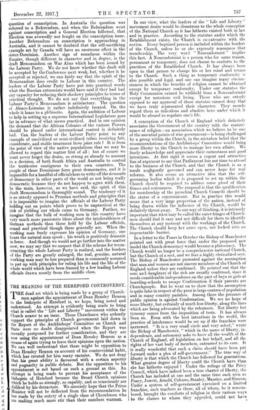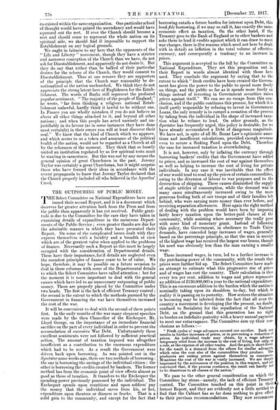THE MEANING OF THE HEREFORD CONTROVERSY.
THE dead set which is being made by a group of Church- -I. men against the appointment of Dean Hensley Henson to the bishopric of Hereford is, we hope, being noted and understood. An attempt is evidently being made to bring what is called the " Life and Liberty ' movement within the Church nearer to an issue. Those Churchmen who ardently support the principles of Church government laid down in the Report of the Archbishops' Committee on Church and State were no doubt disappointed when the Report was recently postponed for further consideration, and they are How using the appointment of Dean Hensley Henson as a means of again trying to force their opinions upon the nation. We can well understand that there might be opposition to Dean Hensley Henson on account of his controversial habit, which has created for him many enemies. We do not deny that his great ability is flavoured with a certain asperity and pugnacity. in public debate. But the opposition to his appointment is not based on such a ground as this. An attempt is being made to prevent his acceptance of the bishopric of Hereford because the Broad Church opinions which he holds so strongly, so capably, and so tenaciously are disliked by hie detractors. We stocerely hope that the Prime Minister will not be deflected from the recommendation he has made by the outcry of a single class of Churchmen who are making much more stir than their numbers warrant.
In our view, what the leaders of the " Life and Liberty " movement desire would be disastrous to the whole conception, of the National Church as it has hitherto existed both in law and in practice. According to the statutes under which the Establishment exists, the •Church is co-extensive with the nation. Every baptized person is included within the borders of the Church, unless lie or she expressly renounces that membership. The very word " Nonconformist " implies this fact. A Nonconformist is a person who for some reason, permanent or temporary, does not choose to conform to the practices of the Established Church. It has always been open to that person to change his or her mind and return to the Church. Such a thing as temporary conformity is also possible and legal, and one can imagine many circum- stances in which the benefits of religion cannot be obtained except by temporary conformity. Under our statutes the Holy Communion cannot be withheld from a Nonconformist except for notorious evil living. Those who are utterly opposed to our approval of those statutes cannot deny that we have truly represented their character. They merely regard them as ridiculous and obsolete laws under which it would be absurd to regulate one's life.
A conception of the Church of England which definitely associates the Government of the country with the mainte- nance of religion—an association which we believe to be one of the essential points of wise government—is being challenged by a group within the Church, in the mistaken belief that the recommendations of the Archbishops' Committee would bring more liberty to the Church to manage her own affairs. We freely acknowledge and appreciate their earnestness and good intentions. At first sight it seems a cogent and attractive line of argument to say that Parliament has not time to attend to the business of the Church, and that the Church is as a result negligently governed and can never hope for real reforms. It also seems an attractive idea that the self- governing bodies which it is proposed to set up within the Church should be required to adduce sonic proof of their fitness and seriousness. The proposal is that the qualification for membership of the parochial Church Councils should be the status of a communicant. But in practice this would mean that a very large proportion of the nation, instead of being drawn within the influence of the Church, would be definitely thrust away. To our way of thinking, it is intensely important that what may be called the outer fringes of Church- men should find it easy and not difficult for them to identify themselves at any moment with the workings of the Church. The Church should keep her arms open, not locked into an impenetrable barrier.
In a letter to the Tunes in October the Bishop of Manchester pointed out with great force that under the proposed new model the Church democracy would become a plutocracy. The Church would no longer be a comprehensive national Church, but the Church of a sect, and we fear a highly clericalized sect. The Bishop of Manchester protested against the assumption that men and women are not sincere members of the Church of England unless they are confirmed. He pointed out that the sons and daughters of the rich are usually confirmed, since it needs considerable independence on the part of boys or girls at boarding-schools to escape Confirmation if their parents are Churchpeople. But he went on to show that the assumption is quite false in respect of the poor in large centres of population and in many country parishes. Among these the pressure of public opinion is against Confirmation. We see no hope of more liberty, but certainly of much less liberty, along the lines which are being advocated by the reformers. Not liberty but tyranny comes from the imposition of tests. It has always been so. Even with the best intentions in the world, the practice of intolerance would be set up if the franchise were
narrowed. It is a very small circle and very select," wrote the Bishop of Manchester, " which in the name of liberty, in- dependence, and autonomy asks to have all the wealth of the Church of England, all legislation on her behalf, and all the rights of her vast body of members entrusted to its care. It is really wonderful that such a claim should have been put forward under a plea of self-government." The true way of liberty is that which the Church has followed for generations. What greater degree of liberty could the Church have than she has hitherto enjoyed 1 Under the rulings of the Privy Council, which have indeed been a true charter of liberty, the Church has included at one and the same time such men as Pusey, Jowett, Arnold, Colons.", Stanley, Maurice, and Simeon. Under a system of self-government exercised on a limited franchise, such teachers as these, all of whom, be it remem- bered, brought the comforts of religion in their various ways to the classes to whom they appealed, could not have co-existed within the same organization. One particular school of thought would have gained the ascendancy and would have squeezed out the rest. If ever the Church should become a sect and should cease to represent the whole nation on its spiritual side, we should find it impossible to support the Establishment on any logical grounds. We ought in fairness to say here that the opponents of the " Life and Liberty " movement, though they have a stricter and narrower conception of the Church than we have, do not ask for Disestablishment, and apparently do not desire it. But they do say that rather than be balked of their particular desires for the reform of the Church, they would consent to Disestablishment. Thus at one remove they are supporters of the principle that the Church may reasonably be de- nationalized or the nation unchurched. We think they do not appreciate the strong latent love of Englishmen for the Estab- lishment. The words of Burke still represent the profound popular sentiment. " The majority of the people of England," he wrote, "far from thinking a religious national Estab- lishment unlawful, hardly think it lawful to be without one. In France you are wholly mistaken if you do not believe us above all other things attached to it, and beyond all other nations ; and when this people has acted unwisely and un- justifiably in its favour (as in some instances they have done most certainly) in their errors you will at least discover their zeal." We know that the kind of Church which we approve, and which seems to us a token and assurance of the political health of the nation, would not he regarded as a Church at all by the reformers of the moment. They think that so loosely united an institution regulated by so few spiritual tests must be wanting in earnestness. But this was not by any means the general opinion of great Churchmen in the past. Jeremy Taylor was certainly a great Churchman, but it might surprise those who have formed their ideas in accordance with the recent propaganda to know that Jeremy Taylor declared that the Church properly included all who believed in the Apostles' Creed.



























 Previous page
Previous page